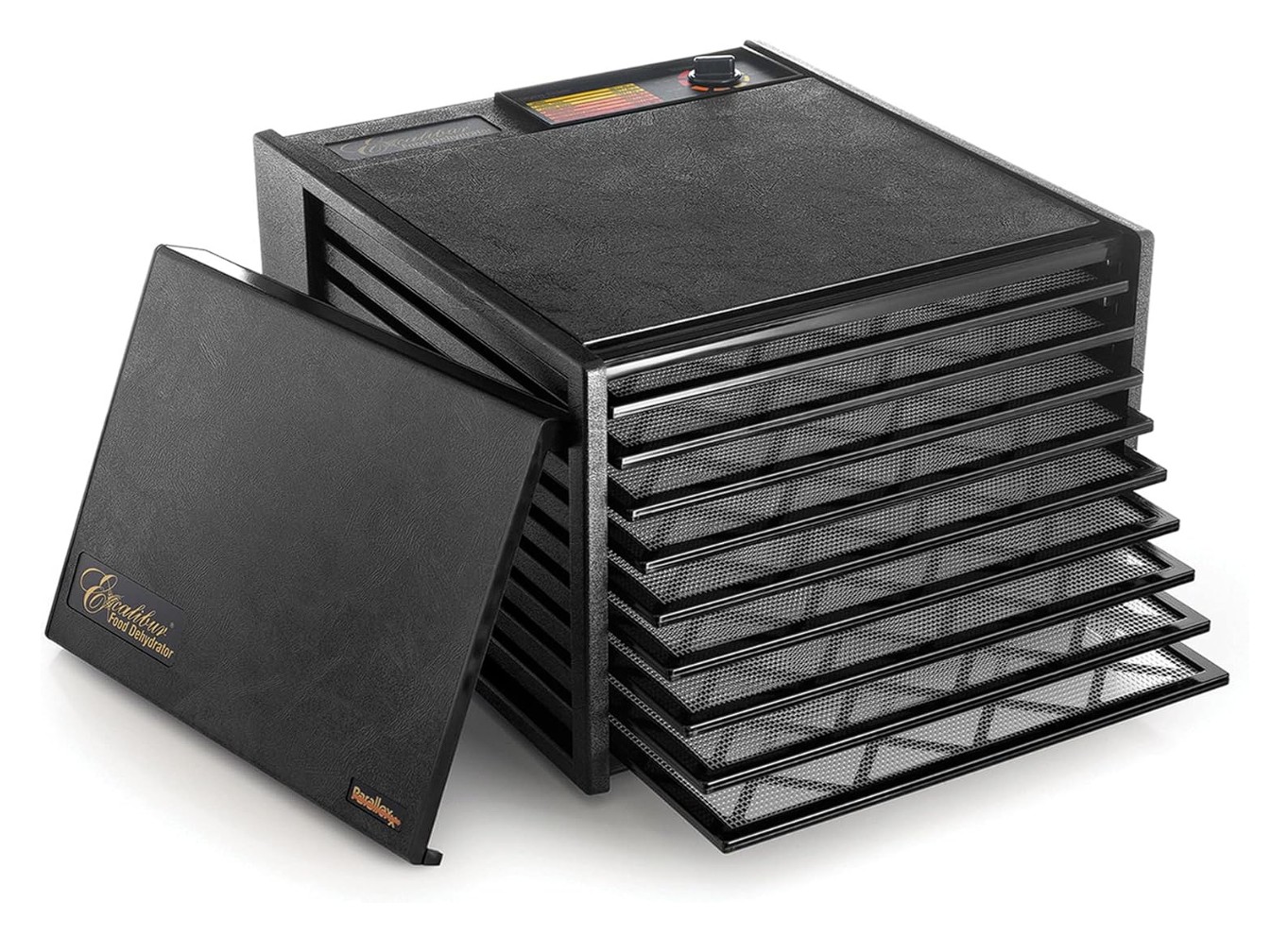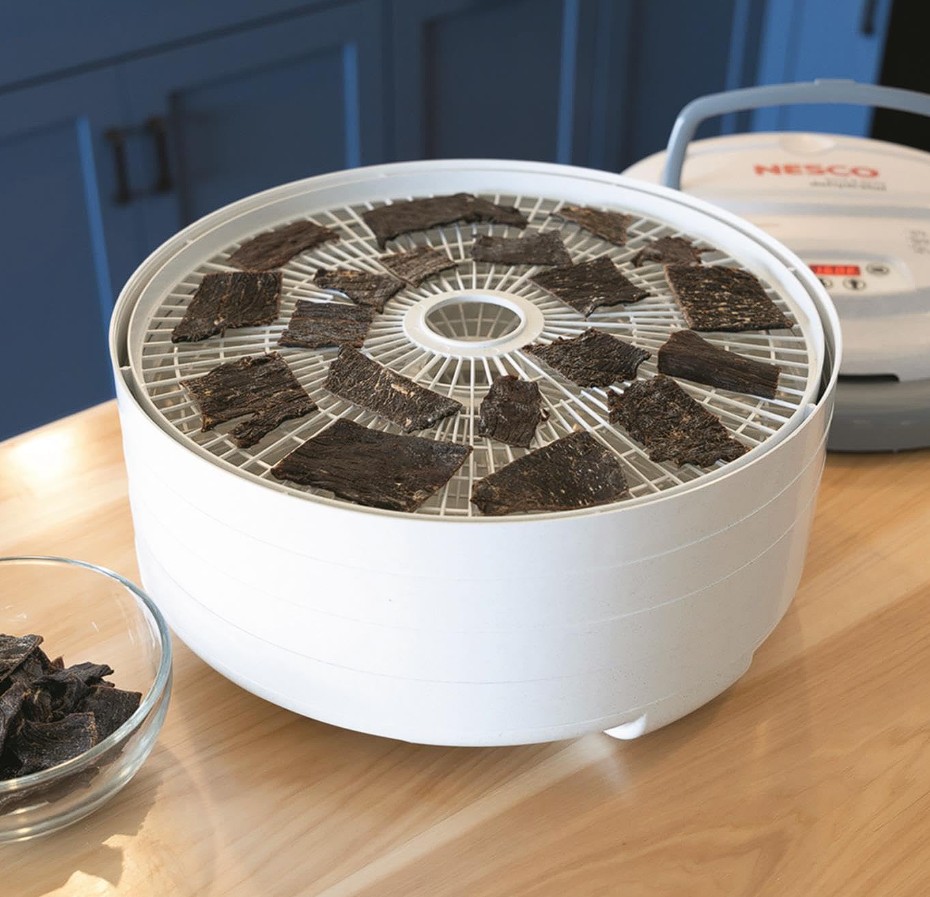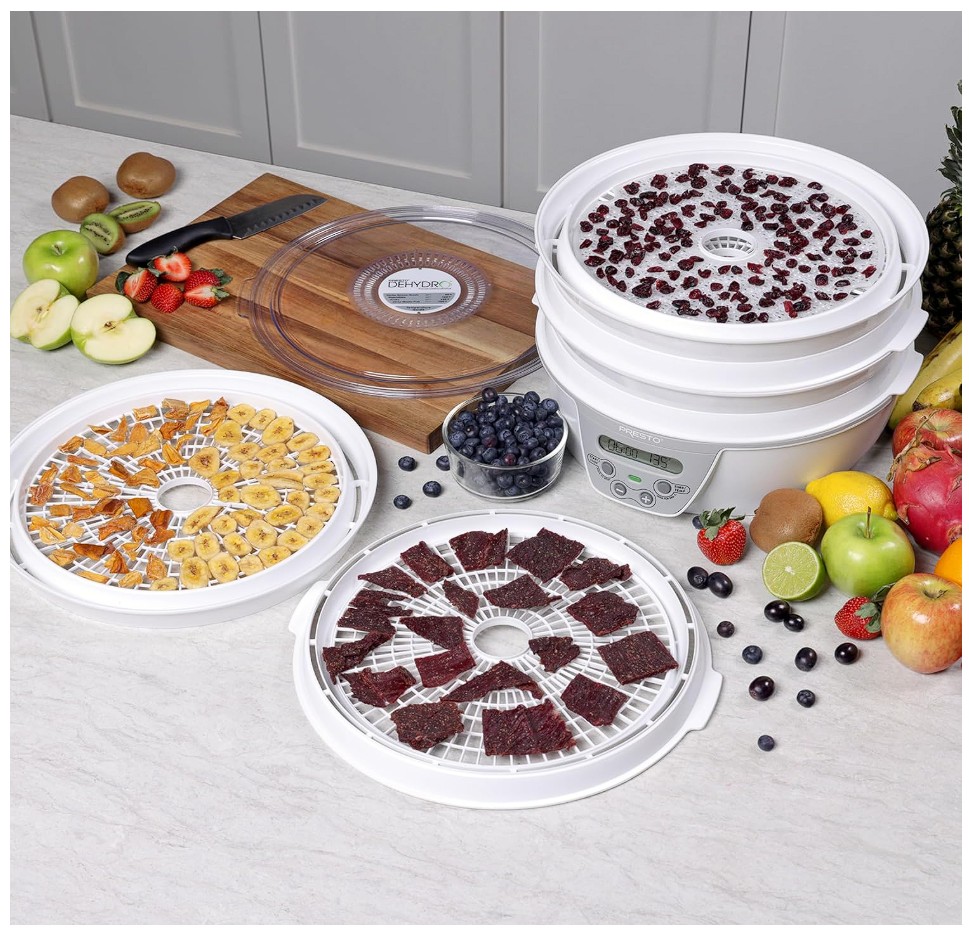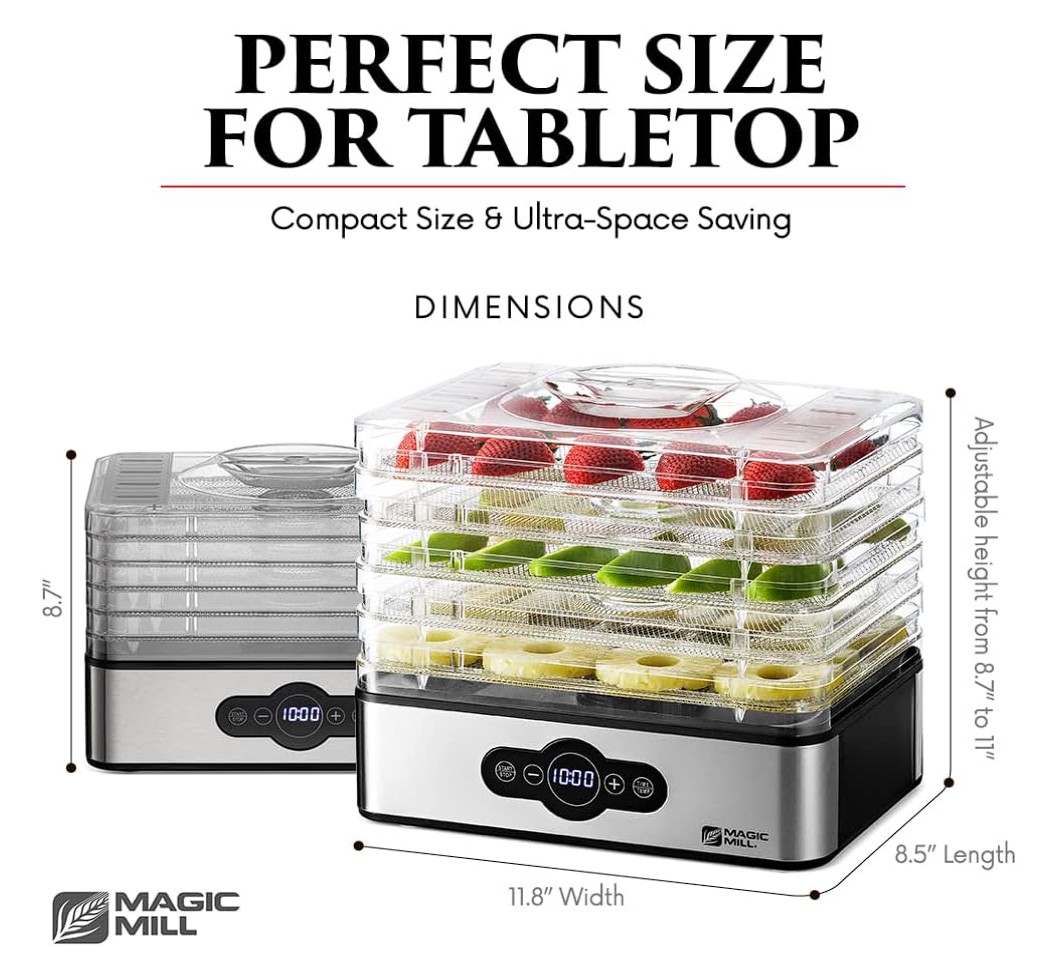There’s a good reason jerky has been around for centuries—it’s delicious, portable, and packed with protein. But not all jerky is created equal.
Store-bought versions are often loaded with preservatives, sugar, MSG, and artificial flavorings. That’s why homesteaders and health-conscious foodies are turning to DIY dehydrating. It’s the ultimate way to preserve meat naturally while staying true to clean, farm-raised values.
Benefits of Homemade Jerky
- Save Money and Skip the Preservatives: Buying jerky at the store gets expensive fast. Making it at home saves money and gives you total control over ingredients—no added nitrates, sugar, or mystery flavorings.
- Customize Flavors, Cuts, and Textures: Use your own pasture-raised meat—beef, venison, turkey, even goat or rabbit—and experiment with marinades using organic apple cider vinegar, tamari, or fresh garden herbs. Customize it to your taste and dietary needs.
- A High-Protein Snack That Travels Well: Homemade jerky is ideal for hiking, camping, road trips, and lunchboxes. It’s lightweight, nutrient-dense, and shelf-stable when properly dried and stored.
Whether you’re raising livestock and working with your own hormone-free, pasture-raised beef or sourcing organic cuts from a trusted local farmer, a quality meat dehydrator makes all the difference.
Let’s dig into what to look for, and our top picks available on Amazon today.
Key Features to Look for in a Meat Dehydrator

The best dehydrators offer consistent airflow, adjustable temperature controls, and easy-to-clean trays. Look for a model with a strong fan and even heat distribution to avoid over- or under-drying.
Temperature Range, Tray Capacity, and Airflow—What Matters Most
To safely dehydrate meat, your machine should reach a minimum of 160°F. Tray capacity is important too—especially if you’re working with larger batches of grass-fed beef, venison, or free-range turkey. Horizontal airflow is ideal for uniform drying.
How to Choose the Right Dehydrator for Your Budget and Kitchen Space
Counter space is gold in homestead kitchens. Consider whether you need a compact unit or a larger one for serious batch work. Many mid-range models offer solid performance without breaking the bank.
Which Meat is Best for Homemade Jerky?

There are many options, but first choose lean cuts with minimal fat to prevent spoilage and achieve the best texture.
Here are the 5 best types of meat for dehydrating:
1- Beef is the most popular and widely used meat for jerky, and for good reason. It’s flavorful, easy to source, and has just the right balance of leanness and texture for drying. Beef holds its structure well during dehydration, resulting in that classic chewy bite. It absorbs marinades beautifully and complements smoky, spicy, or sweet profiles.
Best Cuts for Beef Jerky:
- Top round
- Eye of round
- Sirloin tip
- Flank steak
These cuts are lean and relatively affordable, making them perfect for homemade jerky. Just remember to slice against the grain for tenderness, and trim all visible fat to extend shelf life.
2- Poultry can make excellent jerky—especially when using lean, properly handled cuts.
- Chicken is great when using boneless, skinless breast meat. It’s lean, mild in flavor, and absorbs marinades well. Cook to 165°F before or after dehydrating to ensure safety.
- Turkey is a favorite for low-fat, high-protein jerky. Turkey breast works best. It’s slightly more flavorful than chicken and holds up well to drying and seasoning.
- Duck can be used, but it’s richer and fattier, especially the skin and thighs. Trim thoroughly and monitor for spoilage. Duck jerky is best made from leaner cuts like the breast, and benefits from longer marination to balance the strong flavor.
🛑 Important: With poultry, always ensure the jerky reaches an internal temperature of 165°F for food safety. This can be done before dehydrating (by pre-cooking) or by finishing in the oven.
3 – Goat meat is good for jerky—as long as it’s lean and properly trimmed. Goat is naturally lower in fat than beef, making it well-suited for drying. Its slightly gamey flavor gives jerky a unique taste, especially popular in Caribbean, African, and South Asian cuisines. Use cuts like leg or loin, slice thin, and marinate well for best results. Always trim all visible fat for a longer shelf life.
4 – Wild game like venison or elk also works well. These meats are naturally lean, rich in protein, and full of flavor, making them ideal for drying. Because of their low fat content, they dehydrate well and have a longer shelf life when properly stored. Slice thin, trim all visible fat, and use a bold marinade to enhance their earthy, wild flavor.
5 – Rabbit, believe it or not, is good for jerky. It’s a unique, mild-flavored option—especially great for homesteaders raising rabbits organically. However, there are some important considerations. Rabbit meat is very lean and high in protein, which makes it suitable for dehydrating. Yet, because it’s extremely low in fat and moisture, it can dry out quickly and become tough if not sliced thin and marinated properly. Be sure to use boneless cuts like the loin or hind legs.
Simple marinade recipe
A good marinade can be extremely elaborate. You can keep it simple by using a base of tamari, Worcestershire sauce, or apple cider vinegar. Add black pepper, garlic powder, paprika, or crushed red pepper for kick. Let it marinate for 12–24 hours in the fridge.
Safety Note—Internal Temperatures and Drying Time
This was noted above, but we want to make it ultra clear! Preheat your dehydrator to at least 160°F. Thin, even strips dry faster—typically 4–6 hours depending on thickness. Jerky should be dry but slightly pliable. Store in an airtight container once fully cooled.
Best Overall Meat Dehydrator for Jerky
Incidentally, these dehydrators are suitable for a wide range food preservation that will create a whole host of tasty snacks and treats. Dried fruit leather, veggies, nuts, herbs, and even bread and pet treats! A solid food dehydrator is versatile enough to not only preserve the food itself, but to preserve a food’s nutrition, making for flavorful and healthy quick fixes on the go.
Note: All prices are list prices at the time of publication, but can fluctuate, and can often be found on sale.

Top pick for performance, capacity, and value. Why it’s a favorite: huge capacity, horizontal airflow, adjustable 105–165°F thermostat, durable polycarbonate trays, made in the USA.
Best Budget Dehydrator for Beginners

Affordable, easy to use, surprisingly effective. Perfect for occasional jerky makers and first-timers. 4 trays (expandable to 12). Even and consistent drying that is four times faster than other food dehydrators. Adjustable 95–160°F thermostat.
Best High-End Dehydrator for Serious Jerky Makers

Premium build, precise control, huge capacity. Perfect for bulk batches: stainless steel trays, quiet operation, 48-hour digital timer, transparent door.
Best Compact Dehydrator for Small Kitchens

Space-saving without sacrificing quality
Great for apartments, RVs, and tiny homes. Digital thermostat and timer with temperatures from 90° to 165°F for customized drying. Shuts off automatically to prevent overdrying. 4 trays expandable to 8.
Best Multi-Purpose Dehydrator for More Than Just Jerky

For the homesteader who dehydrates everything. Versatile: 7 stainless steel trays, rear-mounted fan, digital controls. Great for fruits, herbs and meats. Many accessories.
Bonus Section: Jerky Storage Tips to Keep It Fresh
- Let jerky cool completely before storing it airtight.
- Vacuum sealing is best for long-term storage and travel.
- For short-term use, use mason jars with tight lids or BPA-free containers.
- Store in a cool, dark place—or refrigerate—to extend shelf life.
Homemade Jerky is a Smart Homestead Investment
If you’ve got farm‑raised meat in your freezer—whether grass‑fed beef, hormone‑free turkey, or venison—a quality dehydrator is a smart homestead investment. It gives you complete control over ingredients, lets you preserve seasonal bounty, and delivers a healthy, high-protein snack that fits your lifestyle.
Think about what matters most: capacity, space, multi-use, or budget. Then pick the best fit and start slicing, marinating, and dehydrating. Your taste buds (and pantry) will thank you!
And once you become proficient, you can even consider adding it as an income opportunity — it came in at #3 on our list of the best backyard business ideas for homesteaders!
Ready to start your jerky-making adventure? Pick your favorite dehydrator above, gather your best farm-raised meat, and let the natural preservation begin!
See Our Latest Posts
- Simple Recipes for DIY Herbal Salves and Balms
- Delicious One-Pot Homestead Meals from Pantry Staples
- 5 Best Meat Dehydrators for DIY Jerky on Amazon (2025)
- Urban Homestead Hacks from Backyard to Balcony
- Creative Strategies for Frugal Homesteading
Write A Guest Post For Us!
Are you passionate about gardening, raising livestock or preserving food? We’re excited to announce that we’re now accepting guest posts for all aspects of homesteading!

